|
|
|
Sort Order |
|
|
|
Items / Page
|
|
|
|
|
|
|
| Srl | Item |
| 1 |
ID:
177697
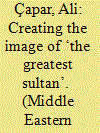

|
|
|
|
|
| Summary/Abstract |
This article aims to demonstrate the role of the children’s periodicals and magazines in the process of formation of the divine and the greatest sultan character in the minds of children between 1876 and 1908. By examining seven newspapers and magazines from that period, this article points out that these materials emphasized merciful, generous, protective, progressive, reformer, religious and powerful sultan images, which played a considerable role in indoctrination and political socialization of children. In this way, as this article argues, the regime tried to form primarily loyal, and then moral, religious, and well-educated generations who would support the regime’s values and norms. The close examination of the children’s periodicals indicates how the patriotism was closely connected to loving and obeying the rules and laws of the owner of the state, which reduced the meaning of patriotism to being loyal to the sultan, praying for his health and continuation of his rule, and celebrating his birthday. While elucidating the children’s periodicals, this article also provides a glimpse on the bilateral relations between the regime and the publishers and the censorship policy of the period.
|
|
|
|
|
|
|
|
|
|
|
|
|
|
|
|
| 2 |
ID:
109209
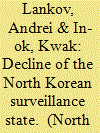

|
|
|
|
|
| Publication |
2011.
|
| Summary/Abstract |
One of the peculiarities of the North Korean system is the cohesive nature of state surveillance. This surveillance operates through two major channels: at his/her job a North Korean is controlled by the "organization," and in his/her place of residence surveillance is done by the "people's group." This article, based on the refugees' testimony and available publications, traces the origin and the types of surveillance used by the "people's groups." Nonpolitical activities of the "people's groups" are discussed as well. Finally, the article traces how the "people's groups" have changed in the last two decades as state control began to disintegrate.
|
|
|
|
|
|
|
|
|
|
|
|
|
|
|
|
| 3 |
ID:
156919
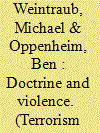

|
|
|
|
|
| Summary/Abstract |
Military theorists and practitioners have long argued that training shapes how combatants treat civilians during war. Yet there is little systematic evidence regarding the impact of training on wartime behavior, and almost none for non-state armed groups, despite the fact that such groups intensively train their fighters in order to shape their behavior towards civilian populations. This article argues that among insurgent groups that emphasize the strategic and tactical importance of restraint towards civilian populations, political training can reduce civilian killings. We test the observable implications of our theory in the case of Colombia, using survey data on former Revolutionary Armed Forces of Colombia (FARC) insurgents and sub-national data on civilian killings. We find support for our hypothesis, with results that are robust to a range of model specifications and controls, including alternate sources of combatant discipline and obedience, such as military training and punishment.
|
|
|
|
|
|
|
|
|
|
|
|
|
|
|
|
| 4 |
ID:
129268
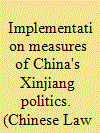

|
|
|
|
|
| Publication |
2012.
|
| Summary/Abstract |
This issue is a collection of twelve documents on the policies in Xinjiang. These policies can be grouped into four categories: economic inducements, ideological indoctrination, cultural assimilation, and social control. Economic inducements are provided on the assumption that economic growth will benefit the ethnic minorities. Satisfied materially, their tendency to resist is weakened. Ideological indoctrination has the power to cultivate political identification with the regime of China through an official narrative of historical view and the contribution of the regime to the economic and social development of Xinjiang. Cultural assimilation is to integrate Uighurs culturally with the Han-dominated Chinese culture through education. Social control is to establish a coercive system for preventing subversion and punishing the secessionists in order to weaken the will to resist.
|
|
|
|
|
|
|
|
|
|
|
|
|
|
|
|
| 5 |
ID:
113943


|
|
|
|
|
| Publication |
2012.
|
| Summary/Abstract |
The "organizational life" is an important part of the daily existence of North Koreans. Every adult in North Korea has to be a participant in a multitude of rituals that serve a dual purpose of surveillance and indoctrination. In this article, we describe how the organizational life is arranged and also explain the ways it contributes to maintaining the domestic stability of North Korea and to manufacturing consent for the current regime. The study is based largely on refugee interviews.
|
|
|
|
|
|
|
|
|
|
|
|
|
|
|
|
| 6 |
ID:
181196
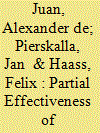

|
|
|
|
|
| Summary/Abstract |
Dictators depend on a committed bureaucracy to implement their policy preferences. But how do they induce loyalty and effort within their civil service? The authors study indoctrination through forced military service as a cost-effective strategy for achieving this goal. Conscription allows the regime to expose recruits, including future civil servants, to intense “political training” in a controlled environment, which should improve system engagement. To test this hypothesis, the authors analyze archival data on over 370,000 cadres from the former German Democratic Republic. Exploiting the introduction of mandatory service in the GDR in 1962 for causal identification, they find a positive effect of conscription on bureaucrats’ system engagement. Additional analyses indicate that this effect likely did not result from deep norm internalization. Findings are more compatible with the idea that political training familiarized recruits with elite preferences, allowing them to behave strategically in accordance with the rules of the game.
|
|
|
|
|
|
|
|
|
|
|
|
|
|
|
|
|
|
|
|
|